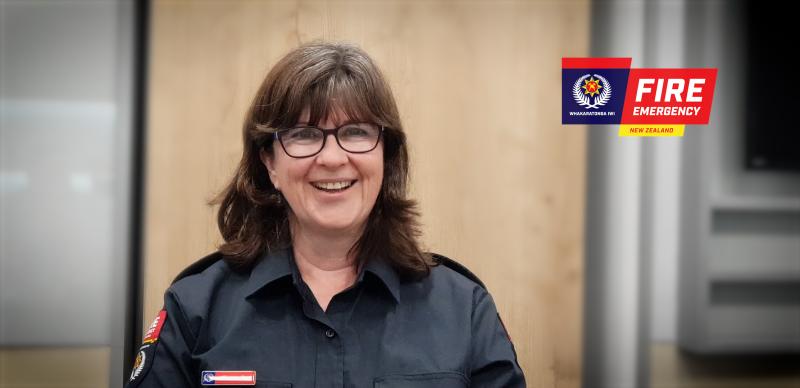I’m Allison, and I have a role in Fire and Emergency New Zealand in risk reduction – I work as part of a team locally here in Hawkes Bay. My journey started in 2008 as someone who wanted to help in my community and someone who wanted to challenge themselves – so I just went to the local fire brigade and knocked on the door and asked if I could become a volunteer. I was nervous as I was aware there weren’t very many women in the fire service at that time, and it took a couple of years to join – probably through my nervousness and through things not being as easy as they are now for women to come along and feel confident enough to join as a volunteer. The journey certainly challenged me physically and mentally to become a firefighter. Yet, over the last ten years, I have progressed from being a recruit to sitting at the front of the truck as an officer. I have learned such a lot that challenged me, but I also gained a vast understanding of our community and how much people care about the communities in which they live. I feel very privileged to be part of that.
What do you think was the hesitance or reluctance that took you the two years to fully embrace going onboard?
I didn’t believe that I could do fire fighting as well as my peers who were already there doing it, and I lacked confidence in myself. I needed to develop personally in that area, and my training gave me plenty of opportunities to do so. I was also in my mid 40’s when I joined, and I wondered if being a middle-aged woman would prevent me from becoming a firefighter.
Yet, I was willing to test myself to see if I could do it, and if I couldn’t, I was still prepared to join the brigade as a support person in admin support or something like that.
If you could go back and talk to your younger self as somebody who was considering taking the first step towards joining the fire service – what would you say to yourself now?
I’d say, ‘you’ve got this – you can do this, and there’s so much ahead of you that you will thrive on and enjoy, and there’s so much that will blow your mind that you can do and will do.’
So – what was the hardest thing you’ve had to do through this?
The hardest thing for me? My personal growth was challenged immensely, and there were weaknesses that I had to take a close look at and develop – and be honest with myself about that – and I needed to gain strength in areas that I didn’t have. I can now say today, after the journey that I’ve gone through, that I have developed those strengths, and while I am still developing them, I am proud of how far I’ve come. From walking in through the door of the brigade with little confidence to being deployed overseas, I have come a long way.
The greatest thing?
The greatest thing for me is that (I can’t say this without crying) – I have been supported by the most fantastic team – from the beginning of my journey until now.
We live in a world that has seen many changes over the last few years around women’s roles. How difficult has your journey been?
I can’t say it’s been an easy journey; things were different back then. There is a much greater awareness now that we need women in all sectors, and we need the strength they bring to the table. There’s acceptance and an acknowledgement of women happening now that hadn’t happened back then. It was much harder to be heard and understood than it is now.
You’re encouraged by what you see changing?
I am encouraged – we have a wee way to go yet, but I think that’s in every sector. I am inspired by being able to see women stand up as part of their fire service experience – they’ve challenged those old ideals, and they are bringing a great deal of change to the scene, and I’ve been privileged enough to hear them speak, to understand them and be part of those changes.
What would your heart message be to somebody who wanted to serve in the community – to convince them that the fire service is the place to be?
I think that I can, hand on heart, say that you have what it takes to be a volunteer in fire and emergency. Whether it is doing the administration work, teaching in schools, or getting on the trucks to respond – we have so many people on the team, from teenagers to pensioners, but we need so many more. We need all kinds of personalities from all walks of life to join us, as the people of the communities we serve are diverse – so you’ve got this – you can do this.
